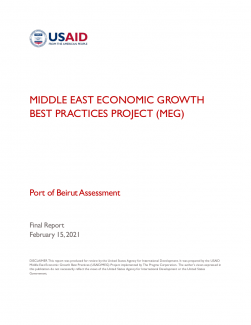DISCLAIMER This report was produced for review by the United States Agency for International Development. It was prepared by the USAID Middle East Economic Growth Best Practices (USAID/MEG) Project implemented by The Pragma Corporation. The author's views expressed in this publication do not necessarily reflect the views of the United States Agency for International Development or the United States Government.
The catastrophic explosion at the Port of Beirut (POB) on August 4, 2020, has resulted in the loss of lives and a high level of injuries and affected many sectors of the economy, including sea transport, healthcare, education, housing, and businesses. The recent disastrous explosion presents an opportunity to build a better and smarter port by mainly addressing the POB governance structure to establish competitive, transparent, and efficient port operations, enabling greater private sector participation and investments, and enhancing port revenues.
Risen in importance due to the Suez Canal's frequent closures between 1956 and 1975, the POB was the most important transit port in the Middle East and North Africa before the 1975 civil war, serving as a gateway for the Levant and Gulf region. The POB was then a major contributor to GDP and job creation in the trade, transport, and logistics sectors. The POB, which was a largely privately-owned joint-stock company, was then operated as a commercial company with a high degree of efficiency and quality services. This situation changed in the early 1990s when the Temporary Committee (TC)/Compagnie de Gestion et d'Exploitation du Port de Beyrouth (GEPB) (hereinafter the "TC/GEPB") was established as the Port Authority (PA) for the POB. Although its regional importance is diminished today, the POB still stands as the largest port operation in Lebanon, serving import, export, transit, transshipment cargo, and a very limited passenger capacity. Most transit cargo is destined to Syria, Iraq, and the Gulf countries. Transshipping is mainly to other ports on the Mediterranean Sea, such as Mersin, Iskenderun, Damietta, Alexandria, and Alger.

